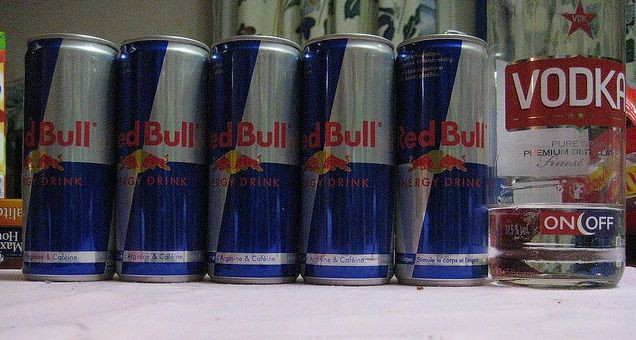Mixing Energy Drinks With Alcohol Increases Consumption, Likeliness Of Feeling Negative Effects

Vodka Red Bulls and Jäger bombs may be delicious, but they’re really just variations of the (now-reformulated) Four Loko and Sparks, two of the many alcoholic energy drinks that were scrutinized for having caffeine and alcohol in the last few years, after a slew of alcohol-related illnesses — 23 at just one college party — were traced back to their consumption. A new study shows that keeping these products caffeine-free could have been a good decision; finding that students tended to drink more alcohol, and therefore, become more intoxicated on days that they also drank highly-caffeinated drinks.
Although there is the occasional person who drinks one too many, and ends up falling asleep, mixing highly-caffeinated drinks with alcohol is not necessarily the best way to ensure a full-night of partying. Mixing these drinks can result in an intoxicated state known as “’wide-awake drunk’ because caffeine is presumed to attenuate some of alcohol’s sedative effects,” the researchers wrote in their study.
But the researchers found that student’s didn’t even have to mix their alcohol with caffeinated drinks in order to feel more intoxicated, to drink more heavily, and to experience negative consequences the day after. Analyzing data on 652 college students over the course of four semesters, the researchers asked the students in four, two-week periods how many energy drinks they had on the previous Friday, as well as how many energy drinks with alcohol they had. They were also asked about whether they got drunk, and whether they felt any of 10 negative consequences the next day, including having a hangover and getting in trouble — with whom wasn’t clear. The students’ estimated blood alcohol content (eBAC) was also measured using start and end times for drinking, body weight, and gender.
They found that 80 percent of the students drank alcohol on at least one of the 56 sample days. Of these students, 30 percent also used alcohol on the same day at least once. Drinking alcohol on days when energy drinks were also consumed resulted in a higher number of drinks consumed, and higher levels of drunkenness — rated by eBAC. But even when these differing levels were controlled for, people who consumed energy drinks on the same day were still likely to report negative consequences the next day.
The time of day that students drank caffeinated drinks had little to no effect on results, the researchers wrote. This was because their results still showed that caffeine affected drunkenness. What’s more, they say that the effects of caffeine can be felt in the body for up to five hours, “making it very likely that the pharmacological effects of caffeine and alcohol overlapped on days students were using both energy drinks and alcohol.”
“Our findings suggest that the use of energy drinks and alcohol together may lead to heavier drinking and more serious alcohol-related problems,” co-author of the study Megan Patrick, of the University of Michigan Institute for Social Research, said in a statement. As energy drink become more popular, we should think about prevention strategies for reducing the negative consequences of using energy drinks and of combining energy drinks with alcohol.” Excessive drinking can lead to a numberof health problems, including liver disease, digestive problems, high blood pressure, eye paralysis, and bone loss, according to Mayo Clinic.
Source: Patrick M, Maggs J. Energy Drinks and Alcohol: Links to Alcohol Behaviors and Consequences Across 56 Days. Journal of Adolescent Health. 2013.
Editors note, Dec. 4, 2013: A previous version of this article incorrectly stated that Four Loko was banned. In fact, the drink was reformulated voluntarily prior to any FDA warning.
Published by Medicaldaily.com



























